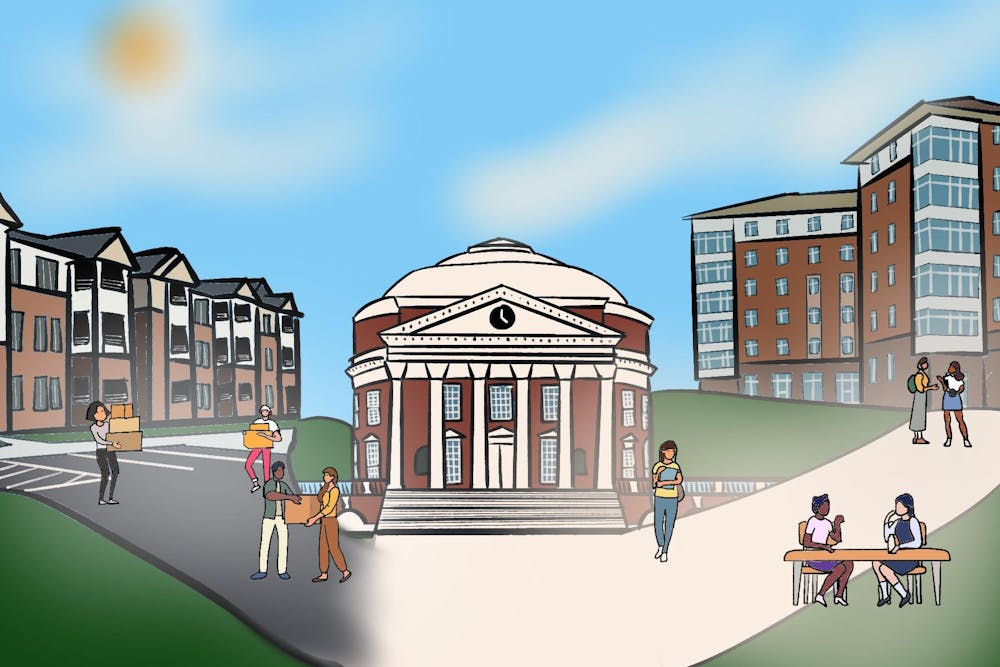As a second-year transfer student from SUNY Binghamton, I understand the stress of transferring institutions. Decoding transfer credits, starting all over and adjusting to an entirely new environment is not easy, and I am certainly not alone. About 13 percent of college students eventually transfer, citing mental health, program quality, location and career programs as their motivation to leave. While transfers to the University will have access to a myriad of transfer-specific programs when they arrive on Grounds, behind the scenes lie structural barriers — transfers are deprived of community and academic opportunities, further alienating transfer students.
The University does recognize the transition to college isn’t easy, and does put in notable effort to help transfer students navigate the University’s programs and opportunities. When transfers are admitted to the University, an advisor reaches out to them directly. This advisor provides information on the University’s Transfer Student Resources, schedules their transfer student-specific orientation, connects them with Transfer Transition Coaches and provides specific guidance for students entering the University following the Year in Wise and Virginia Community College program. These comprehensive programs provide students with mentors to assist with their academic transition and to acculturate them to the University.
But what these programs cannot provide is support for a transfer’s social experience, which is one of the most common stressors for transfers. The University does host transfer-specific socials. Moreover, a huge aspect of social development is the residential experience. Transfers at the University experience housing differently than other newly admitted students — and this housing is not guaranteed. Since transfers have to apply for housing in May — after first-year and upperclassmen students in December — they are left with few options, little time to sign a lease before rent prices skyrocket and no University mechanism to find a roommate.
First-years are required to live in on-Grounds dorms, serving as a fundamental mechanism for developing a residential community and social networks, creating prime opportunities for social gatherings and connections. These residences are located close to Central Grounds, which gives these students more immediate access to on-Grounds sports, events and amenities. Somewhat similar to this residential experience for first-years, transfers are offered some limited regular upperclassmen dorms, and other on-Grounds housing opportunities like Johnson, Malone and Weedon Houses.
However, with these residential opportunities in demand between both transfer and upperclassmen students, these opportunities not only lack a distinctly communal feeling but also may not be available to some transfer students in the first place — the 2025-26 housing application cycle demonstrated the increasing demand for on-Grounds housing. Since transfers aren’t notified of their admission decision until May, they have very few on-Grounds housing options. By losing the residential community which is built in for first-year students, transfer students do not have access to the exciting social networks and community-building opportunities which other students have — only further intensified by being forced to live off Grounds.
While exclusion in residential communities harms social wellbeing, transfer credit barriers compound those stressors in the academic sphere. Though the University posts some guidance for transfers on credit evaluation and provides limited guidance at the beginning of enrollment through their coaches, many students’ credits may only transfer as electives without counting towards completing their major.
Establishing a transfer student’s academic future at the University is especially challenged by the College of Arts & Sciences’ 60 transfer credit cap, which particularly disadvantages students transferring into their third year with more credits than that from their previous institution. Though the policy itself ensures that transfer students complete a majority of credits on Grounds, it puts many transfers in a difficult situation by discounting their previous coursework, causing them to have to repeat classes when prerequisites are often similar across academic institutions.
These consequences will follow them when they apply to advanced majors — namely, applications to the School of Engineering require 50 percent of major requirements to be completed at the University, and the Frank Batten School of Leadership and Public Policy requires 60 University credits for entry. If some prerequisites are not accepted, third-years might already be ineligible and second-year transfers might have to take an extra semester or overload their coursework, adding another undue burden on transfer students.
All of these barriers reinforce a lack of visibility and appreciation for transfers, complicating their experience both logistically and socially before and after they arrive on Grounds. Without a distinct housing experience and with transfer credit barriers that delay or change their academic path, instability prolongs transfers’ adjustment period. Transfer students aren’t asking for special treatment, but for their past efforts to be acknowledged, and to feel a deep sense of belonging at the University. Transfers don’t come to the University to start over, but to build on the journey they’ve already begun.
Jenna Caron is a viewpoint writer who writes about politics at the University. She can be reached at opinion@cavalierdaily.com.
The opinions expressed in this column are not necessarily those of The Cavalier Daily. Columns represent the views of the authors alone.







